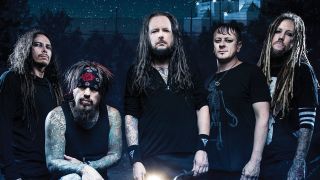In 1993, a group of childhood friends decided to start a band. Drawn to each other by a love of music, drinking and partying, they set about writing songs that would bond them together for life, and transform the landscape of metal forever. At the centre of it was their captivating singer: former coroner’s assistant, misfit, and freak Jonathan Davis. “We were brothers and homies right from the start,” he remembers today.
As Korn prepare to release their 12th album, The Serenity Of Suffering, we delve into their shadowy past. From the early days of living together and scrounging for rehearsal money, to the dizzy heights of fame and fortune, to personal lives shattered by drink and drug abuse. Along the way, they’ve lost band members and lost their minds; be warned, memory lane can get pretty dark along the way, and those of a sensitive nature may not want to go alone. No subjects are off limits as they talk candidly about their highs and lows.
But as much as this is a cautionary tale, the band have few regrets, and we find each of them in good spirits, fresh from completing a US headline tour with Rob Zombie. What’s more, the new album is a return to old-school Korn, heavier than a bag of spanners, and features a guest appearance from Corey Taylor. This, member by member, is the story of how Korn conquered their demons, and conquered the world…
Jonathan Davis
Did you ever dream of being a rockstar?
“Yes. When I was three years old, I saw my parents doing a little production of Jesus Christ Superstar, and that set me on my way. I got my first drum set, and I just really loved music. My father was a musician, and my mother was a dancer, so there was music around at all times.”
What went through your mind when Munky and Head asked you to join their band?
“They were called Creep at the time. Creep was dark and kinda reminded me of Alice In Chains. When I got the call and they asked me if I wanted to try out for them, I was a little torn, because I was doing SexArt at the time, and that was my band. But I wanted to go and see what it was all about, and from the first note I was hooked. It just all clicked.”
You’re quite sensitive. What was it like joining a band that was the opposite of that?
“Well, they basically hired me to do whatever I want. My sensitivity spawned all the lyrics, which eventually became Korn, and everyone had their own vibe, which is what bands do. You can’t set that shit up; it’s just some magic that happens when people get together.”
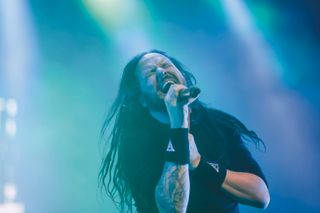
Were your family supportive of your music career?
“At first, my father was very wary. He went through show business and he came off the road, because when I was born he wanted to be there for me, and my mom was bitching that he was never home, which is how they ended up divorcing. My dad didn’t want me to walk down that road, but he knew that I really loved music, so he was like, ‘Fuck it, son, you have to chase your dreams, as long as you have a plan to fall back on.’ I was in the coroner’s office, so I could fall back on that. My mother was the same, but the one who really pushed me along was my aunt. She was the one that took me to a psychic fair and told me I needed to join this band because it was going to be very successful. She pretty much laid out everything, and she gave me money so I had rent and I could eat for a couple of months until I could find a job.”
Do you believe in the psychic stuff, then?
“I believe that we’re all connected through a matrix. Whether you want to call it God or whatever, we’re all connected, and there’s all this weird shit, like, déjà vu or coincidence, and there’s obviously some higher intelligence that’s making this happen. That’s my trip right now, but it might change when I get older.”
You all lived together in California in the early days. What was that like?
“Awesome! We all lived in the same house in Huntington Beach, apart from David [Silveria, then-drummer]. I lived in this little room under the stairs, because it’s all I could afford. The other guys had better rooms because they had better jobs, but we all pitched in, and I really appreciate those times. I didn’t sleep much, because I was a fucking tweeker! I had to go backwards, because I was very successful working in the coroner’s office in the mortuary, and then I was living in a fucking closet after having my own house! It was worth it, suffering for my art; I had to pay my dues. I knew it wasn’t going to be easy.”
What impact has your mortuary job left on your today?
“I had to deal with issues of post-traumatic stress, because 17-year-old boys shouldn’t be seeing [dead] babies that have got ripped in half and fucked when they were 16 months old; crazy, horrific, horrible shit. It kinda fucks your head up. But it also made me inspired and gave me a spark; it makes you appreciate shit, because it’s like, ‘Yeah, I have problems, but I’m alive!’”
Did you wear sports gear on purpose, to create an image?
“I loved those tracksuits! I grew up listening to old industrial music and dark gothic music, but at the time I was a big hip hop fan, and I liked it because it was just so off – it was so not what this music is. That’s what I’m all about, like, ‘What the fuck is going on? Why is this guy wearing a tracksuit and coming out playing bagpipes?’”
Did your self-titled debut really reflect what you were going through at the time?
“That record was my whole high school experience. I was 24 years old, so I had all that to get out. That’s what pushed me to do what I did, pushing the knife deeper into my psyche. It’s not necessarily what I was going through at the time, although there are a couple of songs, but it was my past.”
How do you feel about the song Daddy now, which dealt with abuse by a family friend?
“It was a song that was necessary, and it helped a lot of people. That’s pretty much all I’ve got to say about it. I dealt with a demon and it showed that I could get past those demons and come out the better side.”
Was it real when you cried onstage?
“Yeah. You need to release that energy. Crying is not an unmasculine thing to do, it is a good thing that helps you mentally and physically to get this bullshit out of your body. When I hear someone getting onto a kid for crying because it’s a boy, it makes my skin fucking crawl. When I put myself in those places, it really hurt, and that pain came out again. You never truly get over it; it’s just the way you deal with it and how you process it.”
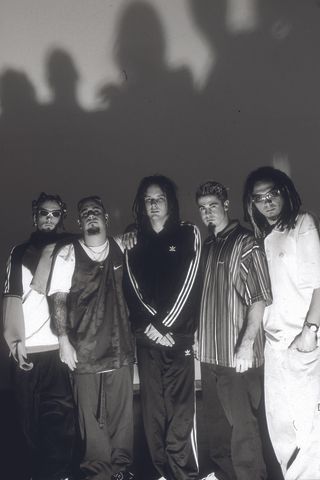
When did you first realise you had a drug and alcohol problem?
“After the first record. The first thing I was told when I joined the band was, ‘If you don’t drink, then it ain’t gonna work out!’ So I started drinking, and then came the speed, the coke, the women and all that other shit. I was living my rock’n’roll dream, and I had the [1991] movie The Doors with Val Kilmer in my head. I embraced all that shit. Why not? I was young. But I found out very quickly, because I was a father at a very young age, that I had a little person who depended on me, and I can’t be coming home drunk, with my pants round my ankles and a rubber still on my dick, puking all over myself. How the fuck is that kid gonna grow up? So I got my shit together. I got sober in 1998 and I haven’t looked back.”
When was the first time you got help for it?
“I didn’t get help. I just stopped. I did it on my own, no AA, none of that bullshit. It was just time for me to stop or I’d die. I had a couple of life-changing things, like Nathan, my oldest, looked at me like I was a piece of shit when he was about three years old, and my grandfather passed away. Those two things at the same time. We were out on the Korn campaign, right when Follow The Leader came out. It was giving me horrible anxiety problems. I did what I had to do.”
What have been the highest and lowest points of being in Korn?
“The highest was making records and touring the world. It was a high that I can’t even explain. The lowest point was when Head left; it was like losing a family member, it just fucking killed us.”
Did you expect that, or was it completely out of the blue?
“It was completely out of the blue. I mean, I got some emails from him reciting some Bible verses and crazy God shit, and I was like, ‘What the fuck is going on?’ Then I eventually heard the news that he was born again. I knew something was up, he was just hurting and he was a single father and had to deal with all that shit, and then the drugs on top of that. Some people need something like God to get through something like that, and that’s fine with me. Who the fuck am I to judge? But the majority, when they become born again, go through a phase where they’re just out of their mind and not thinking straight. He had to go through that, and it really hurt me, and I took it out on him and wrote some songs. But now he’s back in the band, I totally understand and I respect his beliefs. It’s great that he’s a different person and he’s alive, because that fool should have died from all the meth, pills and alcohol. It was amazing that he didn’t die.”
Are you proud of the bands you’ve inspired?
“Yeah. Slipknot were inspired by what we did, but they took it and did their own thing, which is fucking amazing. One that I thought was a big compliment, but I also thought was fucked up, was Sepultura’s Roots album [1996]. That was just a blatant Korn rip-off, and I had it out with Ross [Robinson] about that, because he just took our sound and gave it to Sepultura. My young brain couldn’t handle it. But they were one of our biggest influences, so I guess they get a pass. And that’s a classic album, so it’s all good.”
With the new album, The Serenity Of Suffering, did you make a conscious decision to go back to your roots?
“Munky and Head wanted to do something heavy, like when we were writing for live shows. And Nick [Raskulinecz], the producer, was a big part of that. I think it’s returning to our roots, but it’s new and it doesn’t sound like any of the other albums. It’s fucking heavy, man!”
Do you ever find yourself returning to vocal styles?
“No. The only thing I returned to was that crazy Twist, heavy vocal scat, because Nick wanted me to do that, but I’ve purposely not done that over the years, because if I did it on every record, it wouldn’t be special. It’s the same with the bagpipes; you’ve got to pick and choose.”
What inspired the lyrics?
“We summed it up with the title of the record. I choose to write about the dark things in life. I’m happy, I’ve got a family I love, and I love touring. But when I’m in those dark places and I suffer from depression, it seems like suffering is the place that’s home for me. It’s my familiar old friend, and when I’m happy it’s kind of foreign for me. I’m 45, I’m not 16 anymore, but I’m not singing about high school. There’s still challenges in life and this is my therapy. Half the time, I don’t know what the fuck I’m writing about! It’s like, I’m 45, what the fuck do I have to bitch about? But it doesn’t necessarily get any better.”
How long do you see Korn lasting? Motörhead managed 40 years!
“I would love to do 40 years! I’d be up there with one fucking dreadlock, I don’t give a fuck. As long as my voice is there and the boys can play, it’s fucking on!”
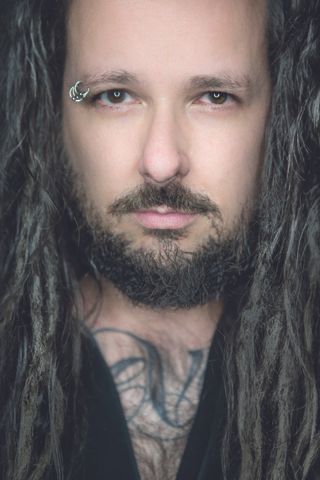
Munky (James Shaffer)
What went through your mind when you saw Jonathan perform with SexArt?
“Head and I were at a club in Bakersfield, and we were about to leave, when all of a sudden we heard this scream from the PA. We looked at each other and we were like, ‘Oh my God!’ We wanted to see whoever this scream was coming out of, so we went back inside, and the singer was this little skinny guy! We couldn’t believe it!”
The band lived together in the early days. Can you describe an average day in that house?
“It’d be us doing odd jobs, just trying to hustle money to scrape beer money together and still have rehearsal money. We tried to get money in whatever ways we could – washing cars, moving furniture – and then maybe we’d go to the beach and surf a little bit, and party all night.”
How did you cope with Korn’s meteoric rise around the time of Follow The Leader?
“I don’t think we were ready for it. There was a bunch of money and success, and that’s what we dreamt of, but we were so young that we took it for granted. We weren’t thinking about tomorrow. We were having fun living in the moment and not thinking about our actions. We partied like crazy, and I wouldn’t change it for anything.”
How did you feel about Korn copycat bands?
“At the time I was like, ‘Man, this is our sound, we created this!’ But it was just ego-based, because all we did was use our influences to create something new and unique. Some of them were pretty obvious, and I still think there’s some bands that don’t own up to that.”
Jonathan mentioned Sepultura as an example. Would you agree with him?
“Yeah, but here’s the thing, that was us trying to imitate them! When Sepultura released Chaos A.D. [in 1993], that was a huge influence on us, and it’s still one of my favourite records. Now I’m older, I can appreciate art inspiring art.”
Where were you when you found out that Head had quit the band?
“I was renting a house in the Hollywood Hills, and I think it was through an email that he’d sent everybody. But I was sitting alone in a big house. I was going through a bad time myself, and I just couldn’t believe it. I was in disbelief for weeks and I was devastated.”
Did you have any idea that he had drug problems?
“Well, all those reasons that he left unfolded later. I took it very personally, and it wasn’t personal, it was something he was doing for himself. At the time, I was like, ‘How could he leave us like this?’ I think the others felt like that, too, not knowing the real reasons for him leaving. We wanted to hear it from him, maybe in a meeting, but maybe he didn’t think he’d be strong enough to do that. I totally understand it now.”
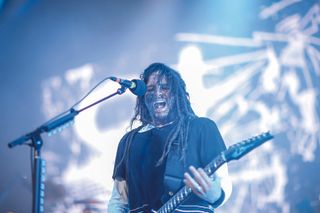
What was it like being in the studio without him for the first time?
“I looked at it as an opportunity to overcome some of the deficiencies in my playing. He was always, and is always, the guy who comes up with these great melody lines, so I was like, ‘OK, maybe this is the chance for me to step up and really take a swing at the sort of playing that he did.’ It was a major challenge, and I was frustrated because it was pushing me into areas that I was uncomfortable with, but at the same time it helped me to grow as a musician.”
David said you became “their target” after he left, which implies you were bullied. Is that true?
“I don’t know. I don’t think that’s completely true, and I don’t think it’s completely false. David and I sided with each other on a lot of the decision-making for the band, at the time, so when he left it was difficult for me to get Reggie [Fieldy] and Jonathan to see my perspective on certain things. But also my perspective was obscured by all the alcohol and drug use, so yes, it is true, and no it isn’t. I was on my own destructive path, and I wouldn’t necessarily say they were bullying me, but it was harder to make them see things in the light that I was seeing them in… which was very dim!”
Was there ever a time when you felt like quitting the band?
“No. Maybe there was one time I got mad and left the tour, but I actually had to go to rehab after a show in Ireland.”
That was 2008, right?
“Yeah, I had a total freakout, a meltdown, and left the tour and went straight to rehab. I was in a bad, bad place. My father was dying at the time. Everybody deals with death in a different ways, and I didn’t know what to do, so I drank, and the feelings of frustration and anger came out. They say you always hurt the ones you love the most, and my bandmembers were the closest people I had in my life, at the time. I just had a complete mental breakdown, fuelled by alcohol and drugs. After about a month in rehab, I had to go through more addiction problems, but it did set me on the right path.”
How do you feel about the last 20 years?
“When I look back at us partying, it makes me feel good that we came out the other side. We think of it more as leaving behind a legacy, and making decisions that are smart to make our kids look at us as role models, and also some of our younger musician fans. You can have the party, but you also have to be smart in your decisions and take your career seriously if you want to get out of your garage.”
On your new album, you have a guest spot from another accomplished musician, Corey Taylor. How did that come about?
“Well, we’re now labelmates, as we signed with Roadrunner. And we did that tour with them, which helped to bridge a friendship between us and Slipknot that has felt bumpy over the years. It felt right, and our producer has worked with Stone Sour on a couple of records. Corey was very receptive, and he came down and killed it! I feel like we’ve been on this journey that has exceeded our dreams as kids.”
Head (Brian Welch)
You met Jonathan and Fieldy when you were at school. What were your first impressions?
“Well, I remember Jonathan in elementary school, and he looked really skinny and kinda nerdy. I wasn’t cool, but I must have thought I was cooler than him, because that’s what I remember. You know Mr Burns from The Simpsons? I look back, and I think if Mr Burns had had a grandkid, it would have been Jonathan! Fieldy I met in junior high. He just had a normal haircut, and on his folder he had Duran Duran! All over my folder, I had Ozzy Osbourne and Iron Maiden and Judas Priest, and I told him he needed to get into metal, so that’s my fault!”
Did you enjoy being famous?
“No, I always felt uncomfortable with it. You feel cool sometimes, when you’re young, but then I always had so much anxiety with it because I didn’t really like myself. Around those years I met Fieldy, I didn’t really like myself, and I got picked on a lot, so I had kind of a self-hatred thing in me. I didn’t know I didn’t like myself, but all of those people looking at me all the time kinda gave me a lot of anxiety, and that’s why I didn’t like it.”
Were there any good parts?
“Obviously Woodstock [in 1999], the Grammys [they won Best Video for Freak On A Leash in 2000], and going to Japan and Europe. For instance, on the Issues album [released in 1999], I was starting to think about the darkness and depression, but then we did the Apollo Theater in New York and Busta Rhymes was there, and Chris Rock, the comedian. A lot of those famous people were coming out to see us, like Brad Pitt came to LA, and Mark Wahlberg, so I had a lot of fun. It was fun to do South Park. But then you get into the grind, and get into those states where it becomes the same day over and over again.”
Why were you feeling depressed around the time of Issues?
“We’d already gotten big with Follow The Leader, and it just went through the roof. Then we had Issues come out, and that was hitting a mountain peak, and I was like, ‘OK, what’s next? Do we just tour forever?’ It was like a tug of war with my emotions. I was trying to be thankful, because everyone wanted to be rockstars, and I became one, but I didn’t really like it. I loved creating music, but I didn’t really like touring; it was heavy.”
What was your craziest night in Korn?
“Craziest night? It should be, ‘What was the craziest year!’ My craziest year was probably 2004, just because that was my massive meth year, and when I took my drugs all over the world and hid them in my suitcase and stuff. That was wild!”
In that year before you left, how did you hide your drug problems from the band?
“Seclusion. I’d be alone all the time. I loved uppers, but when I did that my hands would shake a lot and I’d get real skinny, so I’d take pills and drink a few beers so my hands wouldn’t shake around the band or my family. Even if I wasn’t hungry, I’d nibble on stuff to make it look like I had an appetite, even though I didn’t.”

Do you wish you’d quit Korn earlier?
“I don’t think it was supposed to happen like that. I think it all happened the way it was supposed to, but I did want to quit earlier. I’d been thinking about it since the Untouchables album in 2002. I was so thankful I got to do it, but I kinda wanted to do something else. It’s like a kid in a candy store: if they were able to go to the candy store all the time, they’d get sick of it!”
Why did you choose to be so vocal about your conversion to Christianity?
“Honestly, every relationship I tried to get in, I fell in love with a woman, and it would be good, but then it turned sour. Every single one! So with my Christianity, the reason I knew it was so real is it was a love for God, and I felt His love for me. And it’s never left. It’s like, here’s a love that won’t die and I won’t get heartbroken. I was just like, ‘Man, people need to know this!’”
When did you realise you wanted to rejoin Korn?
“It was after I joined them onstage at Carolina Rebellion [in 2012], and I saw everybody get so emotional: the fans, Jonathan, me, my daughter… My dad, the next day, told me he had tears in his eyes. Like, I just mentioned that God is love, and I felt that love. There’s a connection with the fans that’s stronger than a lot of the other bands out there. And it was a little difficult because I’d been gone so long, and I didn’t like touring or the depression I’d felt on the road with Korn, but I had to face all that. I made sure that it wasn’t like it used to be, with drink and drugs.”
The new record is much heavier than The Paradigm Shift. How much input did you have?
“Me and Munky had a vision for it. I love all the songs on The Paradigm Shift, but translating it live didn’t feel like I wanted it to, so me and Munky were like, ‘What’s missing?’ We love melody, but the intensity was gone. We’re playing the new stuff and it’s on a different level – I can feel these songs in my guts every night.”
What’s more important, God or Korn?
“Looking back, I see that God has been in Korn this whole time. I remember that first album, and the song Helmet In The Bush that me and Jonathan wrote, all on drugs one night, and it’s like, ‘Please God, help me. Please God, save me from this painful situation…’ It was like a prayer in a song. Who’s more important? That’s a stupid question. Obviously Korn will be no more one day, and God will be there. But I love my band.”
- Korn Quiz
- Korn's Head: "Meth Ruined My Mind, My Emotions, My Relationships, My Sanity"
- Listen to the new Korn song featuring Corey Taylor
- Watch Korn scream Britney, Rihanna and Justin Bieber songs
Fieldy (Reginald Arvizu)
You met Jonathan and Head in junior high school. What were your first impressions of them?
“I actually met Head first, and it’s funny because he was pretty much the only heavy metal guy. He was like, ‘You’ve gotta get into heavy metal music’, and I didn’t really know, ’cause I was more into what you’d call new wave. I ended up going to his house and he played some metal, and he played guitar, so that’s what directed me towards it. It was so cool seeing somebody our age playing.’
In the first five years of Korn, you were hanging out with celebrities. Was it fun?
“It’s always been weird. I’ve met pretty much every rockstar I can think of. But I remember in the early days, our manager knew Ice Cube, and he came down to the studio, and I was kinda nervous. I didn’t even know what to say!”
What was it like when Korn’s popularity started to decline in the early 2000s?
“It was a very sneaky thing, because we never really felt like we went down, but now that I look back on it… we were told we were gonna go and do ‘intimate’ shows for the fans, instead of them saying, ‘Hey, you’re gonna be playing smaller places now.’ I thought we could still do arenas, but we were doing 2,000- and 5,000-seaters, and I was like,’Yeah, we need to do that to get back to our roots!’ It was like, ‘No, that’s all you guys can do!’”
Did you start Fieldy’s Dreams because you were bored with being in Korn?
“Well, I think we’re always doing side-projects because we’re sitting around. I’m working on my bass album right now. Now that I’m older, I don’t know if I’d be that quick to get on the mic! I don’t really like that album [2002’s Rock’n Roll Gangster], but what am I gonna do?”
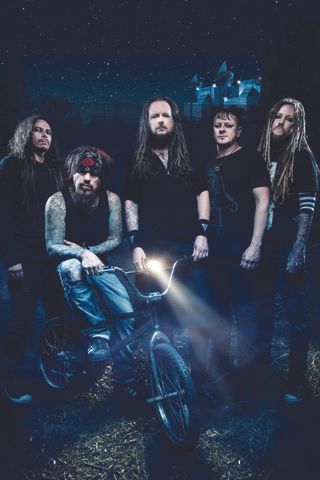
How did you feel about the negative feedback it received?
“It gets negative reviews from me! I don’t like it! But there’s nothing I can do about it now. I would never have put it out. I think it’s dumb, it’s whack, but it’s just what I did when I was younger.”
What was the turning point that made you convert to Christianity?
“I think it was just coming to the end of partying and the fame and all that. It was just an empty void, money and success and power, and then my dad got sick and went into the hospital. He died and went to be with the Lord, and everything just changed for me right there. I realised that I didn’t have any power and money didn’t matter. That’s when I accepted Jesus into my life, and everything started changing. The last 10 years of my life have probably been the best 10 years of my life.”
Head was quite vocal about his faith, and you didn’t seem to talk about it much. Why not?
“His situation was different. His daughter was left with no parents, so he had to go and be a full-time dad. I’ve got kids and I probably would have done the same thing, it just didn’t happen to me that way. I think when he was away from Korn, he had to make it vocal, because he didn’t have anything else.”
Did you deliberately go back to an old-school Korn vibe on this album?
“Yeah. I think doing the 20th anniversary, playing the Korn album all the way through, kinda reminded us of where were started. It brought out the Korn in us!”

Ray Luzier
What were your preconceptions of Korn when you joined the band back in 2007?
“I’ve been a fan of them ever since they came out. I was teaching in a music school at the time, and one of the teachers asked me to pick songs for the students to learn. One of the instructors picked Nirvana’s Smells Like Teen Spirit and Korn’s Blind. I was like, ‘What’s a Korn?’ He told me they were a new band that was blowing up, and I’ll never forget hearing the intro riff to that and just going, ‘Whoa!’”
What was the mood in Korn like when you joined, given they’d lost Head and David?
“Well, they’d had Joey [Jordison] from Slipknot filling in, and Terry Bozzio, and all these different people, and I saw them a couple of times without David. I thought it was missing that heavy, slow groove, and that’s what I was trying to bring back. So the mood was quite frantic for me, but those guys were very calm and confident, which made me happy. I was dry heaving for those first few shows, and it took years to really get my identity in this band.”
At what point did you feel like a proper part of Korn?
“Probably a couple of years in, when I was really settled. At first I was just a hired gun, and I was fine with that, trying to play the songs as best I could. And then when they asked me to be a member in ’09, I was like, ‘Wow! This is the real deal!’ Then I really wanted to find myself as one of the five members.”
How did you deal with Head returning to the band?
“It was awesome, man, because when they swore me in, I was like, ‘Now, if Head can just get back in the band…’ That’s what I wanted! Nothing against the hired guns that got brought in as his replacement, but they wanted the gig so bad that they played perfect every night, and it didn’t have that loose feel. And when Head got back in, just watching him and Munky bounce riffs off each other, it felt very natural quick, y’know? And with the new record, it’s like, ‘OK, we’ve toured for three years now. It’s really time to throw down with it.’”
What did producer Nick Raskulinecz bring to The Serenity Of Suffering?
“He has a way of making a band feel the way they’re supposed to feel. He’s a passionate mofo, man! I’m doing my drum tracks and he’s rocking out with a broomstick in the other room, banging his head! And that’s what it takes. You don’t want someone sitting there staring at their phone – you want someone who’s into it!”
The Serenity Of Suffering is out on October 21 via Roadrunner. Korn tour UK arenas from December 12
TOY STORY
How Korn’s iconic Issues doll got a 21st century update from artist Ron English
Pop surrealist Ron English has satirically reinterpreted famous characters such as Ronald McDonald, and has created art for the likes of Slash and Pearl Jam. For The Serenity Of Suffering, he brought Korn’s Issues doll back to life in a hyper- real, brightly coloured fun-fair setting.
“The idea is the child is a bit older, and he’s pulled his discarded doll out of a rubbish heap and is bringing him back to the carnival he won him at when he was younger,” explains Ron. “The Issues doll is tattered, and a human skeleton is exposed through the tears in the cloth, giving the inanimate object a human presence. The carnival is intended to look like weird toys misremembered by the boy. The perspective reverses at the bottom of the image, flipping upside down. It’s hard to spot and is intended to create a subtle sense of imbalance.”
Ron made a minor change towards of the end of the album design process, replacing his original model with Laken Spurlock, son of the documentary maker Morgan Spurlock. “Morgan brought him to one of my shows, and I knew I had to have him for the project,” remembers Ron. “His intense blue eyes helped me create the effect of the child’s glowing blue eye that echoed the button on the Issues doll.”
The Issues doll has been synonymous with Korn since the album was released in 1999, and Ron reckons it strikes a chord with people because it represents a difficult social transition that everyone is forced to make at some point. “Children have dolls that they impose a lot of emotional reality on over the years, and are later urged by society to discard their once-beloved companion as part of the initiation into adulthood,” he reasons. “A lot of what I do is about creating an emotional description of what it feels like in this culture we all share with inanimate imagery and characters.”
ALONE I BREAK
The story behind the departure of Korn’s original drummer, David Silveria
David drummed on seven Korn albums, and split with the band a year after 2005’s See You On The Other Side. Despite the acrimony of their split, he still has some fond memories of his time with the band.
“The high point was probably around 1999-2000, when our third record came out,” he recalls today. “Radio had given up on trying to stop us from being played; we were being played on every alternative station in the country and we were basically Number One everywhere.”
Of his departure from Korn, David claims he was asked to sit out the band’s Unplugged album and was never invited to return.
“Head was gone at this point,” he recalls, “and we were having problems because we weren’t vibing. One day our manager rang, and he goes, ‘The rest of the band want you to take time off. They all think you’re burnt out.’ I called bullshit and told him to go fuck himself. They never called me to say it was over or to get back together and write the record. They never called me about anything. I wish I’d gone to them the day the manager called and said, ‘What the fuck is going on?’ I wish I’d done that differently because I would never have been out of the band if I’d confronted them instead of telling them to fuck off.”
On whether he misses life in Korn, David doesn’t mince his words.
“I miss everything, are you kidding me? I miss being onstage in front of thousands. I miss getting on the bus with my friends. I miss the shows. If I saw Jonathan in the street now, I’d say, ‘Hi, how are you doing?’ I definitely disagree with his decision making and the band, but it’s been a long time and I don’t care about that any more. I’d be courteous and nice to all of them.”
After Korn, David focused on running two restaurants, and is now looking for a new band. Jonathan declined to comment when we asked him about David’s departure.
All day I dream about success: how Korn dragged nu metal into the big time
